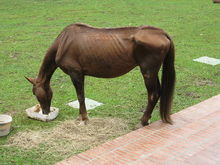Does your horse have difficulty maintaining a healthy weight? Do his ribs protrude despite your best efforts to keep him well-fed? Is your horse a "hard keeper"?

Ribs showing = Underweight horse
Perseverance, along with changes to minimize stress, will yield results and turn your underweight horse into a healthy, more energetic athlete.
© 2013 by George Donnelly
An underweight horse with little appetite doesn't just look unhealthy. He has no energy reserves to draw on, so he'll be easily fatigued as well as vulnerable to injury and disease. It is important for the horse owner to quickly determine the cause of the weight loss and then take steps to ensure the horse is getting the necessary nutrition to keep him healthy and happy.
Why is he losing weight?
Many possiblities should be considered, including:
- Poor dental health
- Previous or ongoing injury or illness
- Parasitic infection
- Emotional stress, such as that caused by an environmental or lifestyle change
- Burning more calories than are taken in
- Poor-quality feed that provides inadequate nutrients
- Gastric ulcers, which compromise the appetite as well as the absorption of nutrients from feed
- Competition for feed from herdmates
- The physical demands of nursing a foal or (for stallions) breeding
- Lameness, which may compromise a horse's mobility and make it difficult for him to consume enough feed
- In horses 20 years and older, a decreased ability to digest feed and absorb nutrients across the gut wall
- A poor balance of fiber-digesting microflora (helpful bacteria) in the cecum, often the result of illness and/or antibiotic treatment
Tempting the picky eater
If your horse fails to gain weight because he is a picky eater, nibbling half-heartedly at his meals and leaving much of it untouched, here are 6 tips to encourage weight gain:
- Experiment to discover what suits his fussy palate by trying different feed formats, from sweet feed to pellets to extruded 'kibble', and top dressings, such as molasses, honey, or applesauce, to see what tempts his appetite.
- Try moistening his grain with warm water to see if that suits him better.
- Feed small quantities, often. Some horses seem overwhelmed by large meals, and smaller quantities are also digested more thoroughly.
- With a fussy eater, freshness is imperative. Remove any feed that isn't consumed within an hour or so. Scrub out the feed tub on a daily basis.
- Try offering his hay in a hay net rather than on the floor of his stall.
- Make sure that he has a constant supply of fresh, clean water available. Even a horse with a good appetite will decrease his feed intake if his access to fresh water is restricted.
Keep in mind that visible change may be slow in coming. As a sage horseman once observed, "You've got to fill up the inside first, before you see a difference on the outside." But perseverance, coupled with lifestyle changes to minimize stress, will eventually yield results and turn your underweight horse into a healthy, more energetic athlete.
Certain breeds, such as Thoroughbreds, are predisposed to being hard keepers because their metabolisms are designed for maximum speed rather than maximum efficiency.
But it is possible to help even a "genetically" skinny horse maintain a healthy weight -- and a few simple nutritional strategies, in addition to comprehensive veterinary care, can help restore some flesh to a horse who has lost too much.
